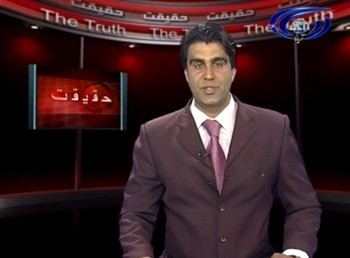Muhammad Naseer Fayyaz, an Afghan journalist, news anchor and the host and writer of the political show “Haqeeqat” (The Truth) in ATN TV channel was arrested on July 28 by Directorate for National Security (DNS, Afghan intelligence service) for assessing and criticizing the actions of the Afghan government under Hamid Karzai.

Naseer Fayyaz in popular Haqeeqat show.
The reason for his arrest was his sharp criticism of the actions of Afghan government in the past four years in particular of the Cabinet.
Right after his arrest a case has been filed against him by the Attorney General’s office for further investigation, as ordered by the Ministers Council of Afghanistan.
The Haqeeqat show was aired on July 27 in Kabul, right in the middle of the show it was stopped of broadcasting. It is said that the President Hamid Karzai’s office had called on ATN to urgently stop the show.
There has been no news about Naseer Fayyaz’s condition and Ariana Television has tried getting in touch with National Security but they deny on quoting about this particular issue. According to his friends, Naseer Fayyaz was abused and assaulted by the National Security.
[utube]Xzk8p8In6as[/utube]This is not the first time for Naseer Fayyaz to face assault from the government. He was threatened by the parliamentarian and warlord Abdul Rasul Sayyaf and Qasim Faheem for his highly acclaimed political show “Haqeeqat” in which he assesses and interviews government officials on particular issues and condemns the government for its failure in different fields.
In August 2007, conservative members of parliament physically attacked a team from Tolo TV and called for them to be expelled from the premises after it broadcast footage of slumbering deputies.
Afghan journalists are under much pressure by the government and the warlords. Any criticism of warlords and the government polices, follows threats and ill-treatment for them.
The case of young journalist Parviz Kambakhsh has been widely reported, who was sentenced to death for just downloading an article from the internet which, according to court, is anti-Islamic. Despite international condemnation and protests in Afghanistan for his release, he is still imprisoned and being abuses.
On June 8, 2008, Abdul Samad Rohani, freelance journalist, working for BBC, was shot dead in the insurgency-torn southern province of Helmand by unidentified gunmen.
On May 15, 2008, Nilofar Habibi, a young journalist in Herat TV was stabbed by unknown men who threatened her to stop appearing on T.V.
On June 1, 2007, Shokiba Sanga Amaaj, a newscaster for private Shamdhad TV was killed in Kabul.
On June 6, 2007, Zakia Zaki, manager of Peace Radio in Afghanistan, was gunned down in her house in northern Parwan province.
On April 8, 2007, Afghan journalist Ajmal Naqshbandi was beheaded by Taliban.
Committee to Protect Journalists announced on May 1, 2008 that the situation of press it getting worse in Afghanistan: “Journalists in Afghanistan operate under extreme tough conditions. The regional warlords set the limits of free expression. It is more open in Kabul, but even in Kabul there are journalists who are under lot of pressure from religious groups and also there is a limited economic means.”



